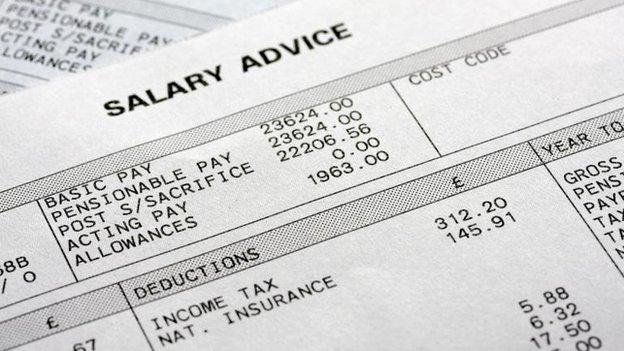Tax statement errors affect thousands, says HMRC
- Published

Employers supply information to HMRC in a regular basis
Thousands of people will receive a second tax statement from HM Revenue and Customs (HMRC) after their first estimate was miscalculated.
More than five million taxpayers received an initial estimate because they paid the wrong amount of tax in the year to April.
But HMRC said errors had emerged in the process, mainly because it had received incomplete information from employers.
Fewer than 100,000 people were affected, HMRC said.
An accountancy body has accused the tax authority of double standards over accuracy.
Cross-check
Workers who have more than one source of income or who moved jobs during the year sometimes pay the wrong amount of tax as a result.
Every year, HMRC staff cross-check the amount paid with information from its own records, from self-assessment forms, and from PAYE information from employers.
The result is a statement that says more tax will be collected during the subsequent year, or that the individual would receive a rebate cheque.
Typically, the amount involved is about £200, a spokesman for HMRC said.
'Lessons to learn'
This year, errors were made with the initial statements, which have come to light following emails leaked to the Daily Telegraph, external.
This was primarily because employers had not included tax information from the final month of the tax year, HMRC said.
"The majority of the errors have happened because an employer failed to make a final payment statement for the 2013-14 tax year meaning our records were incomplete despite reminders that these submissions had to be made," a spokesman for HMRC said.
"We are sorry this has happened and we will issue corrected calculations in the next few weeks."
The tax authority said it would "push the boat out" to help those who had already received a rebate and spent it.
Repayments of unpaid tax are paid in interest-free monthly instalments over the following year, although this can be stretched to up to three years if agreed.
However, HMRC has been criticised for double standards - making errors in accuracy while demanding that taxpayers' own paperwork is precise.
Chas Roy-Chowdhury, head of taxation at the ACCA, said: "There should be proper measures to check the integrity of the information. HMRC needs to sharpen up its act."
Jason Piper, technical manager of tax and business law at the ACCA, said: "Yet again, we are seeing errors in the operation of PAYE, and HMRC must learn the lessons from earlier problems and be transparent and accountable this time around.
"Public patience is wearing thin with government IT failures, and one like this which hits so close to home for taxpayers the length of the country, is bad news for a department trying to extend the reach of its powers into every aspect of our collective financial lives based on the power of its computer systems."
HMRC and employers now use a system called Real Time Information that is supposed to ensure accurate PAYE information is sent regularly, rather than just at the end of the tax year.